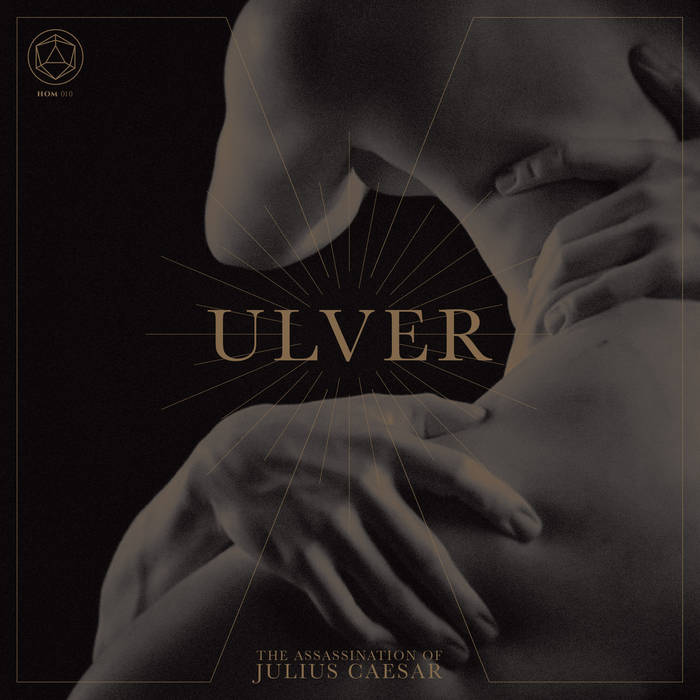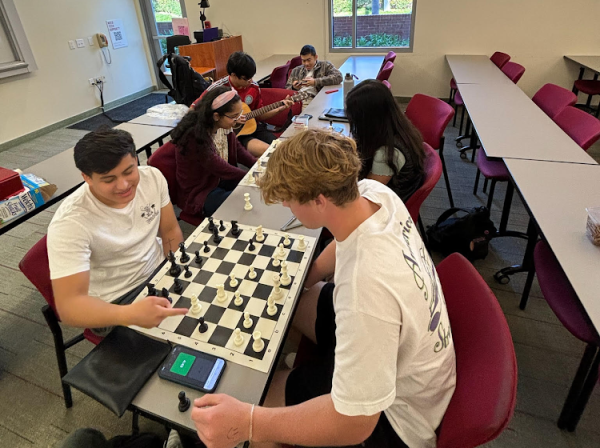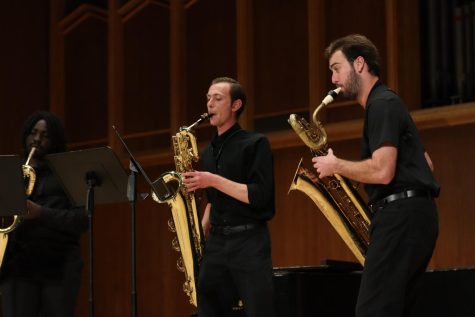Ulver returns to tripped-out beats
“The Assassination of Julius Caesar” guides listeners through seismic fables with accessible structures.
April 25, 2017
Since the band started in the mid ‘90s, Ulver has gone through more stylistic metamorphoses than most bands could dream of. Named “Wolf” in Norwegian, they have tackled everything from folk-inspired black metal, ambient and film soundtracks to psychedelic rock, trip-hop and catholic masses. Ever the tricksters, Ulver takes an unexpected foray to beat-oriented atmospheres with their newest record.
Danceable beats and exuberant modulations
“The Assassination of Julius Caesar” wears its melodrama on its sleeve. Mastermind and lead vocalist Kristoffer Rygg always has a unified concept surrounding his music, and this time he chose one of the most important and enduring events in human history to hang his narrative spanning history, mythology and social commentary. Ironically, this multifaceted aesthetic culminates in what Ulver calls their pop album. Danceable beats and exuberant modulations make “Assassination…” the perfect foil for last year’s “ATGCLVLSSCAP,” which consisted of amorphous, improvised “free rock.”
The fat four-on-the-floor groove that begins “Nemoralia” immediately evokes ‘80s revival. Almost every track on this record features a uniquely constructed beat at the helm, with Rygg’s unmistakable singing soaring over the top. These two factors allow the keyboard ornamentation to uniquely shine where other throwback albums fall flat. The track “Rolling Stone” gives one of the best examples of this, with Rygg almost crossing into gospel territory over an evolving combination of hand percussion and a slamming synthetic backbeat. The meat of the track sets in this hypnosis, before a harrowing crescendo reminds listeners of Ulver’s intensity with grating arpeggios, percussive flourishes and shrieking saxophones.
This album’s diversity of sound within established confines is unmatched. Every track has a flavor separate from the rest. “So Falls the World” makes use of triplet-based piano chords and downtempo power ballad drums saturated in shimmering pads and trickling staccato lines, but its last two minutes bump up the tempo for a driving synth-pop instrumental jam. By contrast, “Angelus Novus” remains in brooding soundscapes, allowing its nuanced layerings to make it one of the most atmospherically riveting cuts on the record. What ultimately holds everything together is Rygg’s sorrowful vocal reprisals. Bringing ancient tragedies into modernized scrutiny, his lyrics’ stark simplicity and stunningly melodious range make each track profoundly haunting.
infamous calamities and destitute uncertainties
Ulver tips a hat to Michael Jackson-esque angular synth basslines and syncopated drumming from “Southern Gothic.” Changeling rhythm changes keep this song interesting, as percussive keyboard stabs play over swelling ambience in a balance of mood and danceability. No matter how infectious “Assassination…” gets, the band always keeps one foot in the sprawling melancholy they built their career around.
“Transverberation” brings Toto to mind with its harmonious bass and wonderfully cheesy keyboard patches, but it does not revel in this plasticity. Ulver keeps things from becoming too over-the-top by keeping real instruments in the background. “1969” follows a similar school of thought. Its reverberant modulations are held on by dreary halftime beat, but the distorted guitar rumbling underneath its chorus adds to its explosive nature. This song in particular sports Christian lyrical themes, something Rygg has made use of throughout his career. However, one should not assume this coincides with his spiritual orientation, but a source of dramatism he has found appreciation for.
Closing with “Coming Home,” “Assassination…” delves farther into Ulver’s volatile experimentation. This ultimately makes the album indispensable. Electronic claps, bass drops and rattling hi-hats lay the rhythmic foundation, but real drums creep into the mix as pulsating synthscapes build to a sublimely strange jam. Everything from flute to saxophone makes an appearance, as Rygg bids a morose farewell: “My family / My children / My haven / My hope / What have I done / To leave you here?” By giving their indubitable twist on yesteryear’s music, Ulver brings infamous calamities and destitute uncertainties near to mind.







